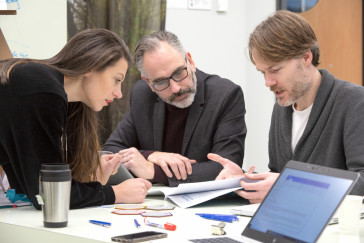This article is based on five years of longitudinal participatory action research on how former pre‐bachelor programme students with a refugee background experience finding their way into Dutch higher education and society. The four‐member research team and authors (two of which were former refugees), found that refugee students face a significant barrier of “us‐versus‐them,” especially in an educational context. We explored how creative co‐creation contributed to rethinking difference and sameness in higher education by breaking through or transcending this divide. Creative co‐creation through play, storytelling, or constructing artefacts enables “alterity,” approaching the other from the other’s position. Movement and action help to shape the world around us: Connecting and shifting positions creates sameness while leaving space for difference. Creative co‐creation during our research process included making co‐creation artefacts and activities, thus involving outreach to broader audiences for engagement. In the research process, it became clear that successful participation matters to all students and provides more opportunities for all, not just refugee students. A new notion of “we” in Dutch higher education and society that does not perpetuate the divide between “us” and “them” requires a shared responsibility. Higher education needs the university authorities and the teachers to make room for student stories and should provide spaces for dialogue and community development.
LINK
In the past 5 years Electric Car use has grown rapidly, almost doubling each year. To provide adequate charging infrastructure it is necessary to model the demand. In this paper we model the distribution of charging demand in the city of Amsterdam using a Cross-Nested Logit Model with socio-demographic statistics of neighborhoods and charging history of vehicles. Models are obtained for three user-types: regular users, electric car-share participants and taxis. Regular users are later split into three subgroups based on their charging behaviour throughout the day: Visitors, Commuters and Residents
DOCUMENT

Single-Use Plastics (SUPs) are at the centre of European Union Agenda aiming at reducing the plastic soup with the EU Directive 2019/904. SUPs reduction is pivotal also in the Dutch Government Agenda for the transition to a Circular Economy by 2050. Worldwide the data on SUPs use and disposal are impressive: humans use around 1.2 million plastic bottles per minute; approximately 91% of plastic is not recycled (www.earthday.org/fact-sheet-single-use-plastics/). While centralised processes of waste collection, disposal, and recycling strive to cope with such intense use of SUPs, the opportunities and constraints of establishing a networked grid of facilities enacting processes of SUPs collection and recycling with the active involvement of local community has remained unexplored. The hospitality sector is characterised by a widespread capillary network of small hospitality firms nested in neighbourhoods and rural communities. Our research group works with small hospitality firms, different stakeholders, and other research groups to prompt the transition of the hospitality sector towards a Circular Economy embracing not only the environmental and economic dimensions but also the social dimension. Hence, this project explores the knowledge and network needed to build an innovative pilot allowing to close the plastic loop within a hospitality facility by combining a 3D printing process with social inclusiveness. This will mean generating key technical and legal knowledge as well as a network of strategic experts and stakeholders to be involved in an innovative pilot setting a 3D printing process in a hospitality facility and establishing an active involvement of the local community. Such active involvement of the local inhabitants will be explored as SUPs collectors and end-users of upcycled plastics items realised with the 3D printer, as well as through opportunities of vocational training and job opportunities for citizens distant from the job market.
Kennisnetwerken in het Nederlandse onderwijsveld zijn door formalisering en schaalvergroting aan een nieuwe fase begonnen. In dit project wordt kennis over de effectiviteit van deze formele netwerken hertaald naar de huidige situatie.

Kennisnetwerken in het Nederlandse onderwijsveld zijn door formalisering en schaalvergroting aan een nieuwe fase begonnen. In dit project wordt kennis over de effectiviteit van deze formele netwerken hertaald naar de huidige situatie.Doel Kennisnetwerken in het Nederlandse onderwijsveld richten zich op de ontwikkeling van onderwijsprofessionals en -organisaties. Het zijn geneste systemen met een collectieve verantwoordelijkheid voor organisatie-overstijgende onderwijsvraagstukken. Dit onderzoek brengt voor 12 regionale kennisnetwerken in kaart hoe zij als complex systeem functioneren, wat de opbrengsten zijn en onder welke omstandigheden die zich voordoen. Doel is ontwerprichtlijnen voor optimale, duurzame processen van kennisontwikkeling, -deling en -benutting in regionale kennisnetwerken te formuleren. Het gaat hier om netwerken waarin scholen, kennisinstellingen en bedrijven plaatsnemen en samenwerken aan bijv. een duurzame onderzoekscultuur. Resultaten ontwerprichtlijnen voor optimale, duurzame processen van kennisontwikkeling, -deling en -benutting in regionale kennisnetwerken jaarlijkse reflectiesessies voor de kennisnetwerken leidraden voor de kennisnetwerken en de gehele onderwijspraktijk wetenschappelijke artikelen en bijdragen aan congressen Looptijd 01 juli 2023 - 31 december 2027 Aanpak We zetten verschillende elkaar aanvullende kwalitatieve en kwantitatieve onderzoeksmethoden in zoals sociaal netwerk vragenlijsten, (groeps-)interviews en document/productanalyses ten behoeve van within-case en cross-case analyses. Vanuit lectoraat Werken in Onderwijs voegen wij o.a. expertise toe over sociaal netwerk analyse.
Lectorate, part of Saxion